Algunos lectores nos han preguntado cómo deshabilitar la barra de administración de WordPress. Si bien es un ajuste menor, algunos usuarios prefieren hacerlo por diversas razones, como mantener una interfaz de usuario más limpia o mejorar la experiencia del usuario para los usuarios que no son administradores.
Por defecto, puedes deshabilitar fácilmente la barra de administración de WordPress para usuarios individuales. Sin embargo, esto puede consumir mucho tiempo si tienes un gran número de usuarios registrados en tu sitio.
En este artículo, te mostraremos cómo deshabilitar fácilmente la barra de administración de WordPress para todos los usuarios, excepto los administradores.
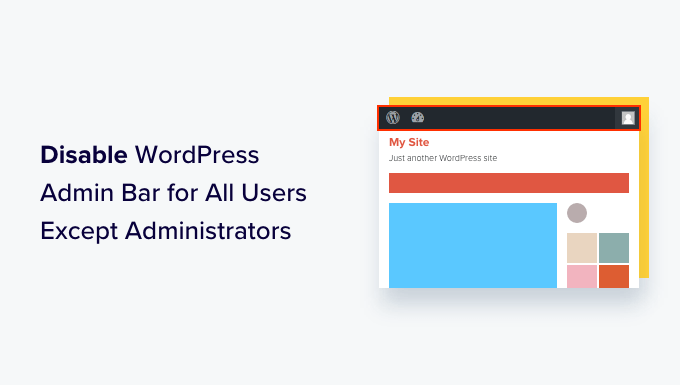
¿Qué es la barra de administración de WordPress?
Por defecto, WordPress muestra una barra de administración en la parte superior de la pantalla para todos los usuarios conectados. Cuando inicias sesión en tu cuenta, puedes ver esta barra de herramientas en el área de administración de WordPress y en todas las demás páginas.
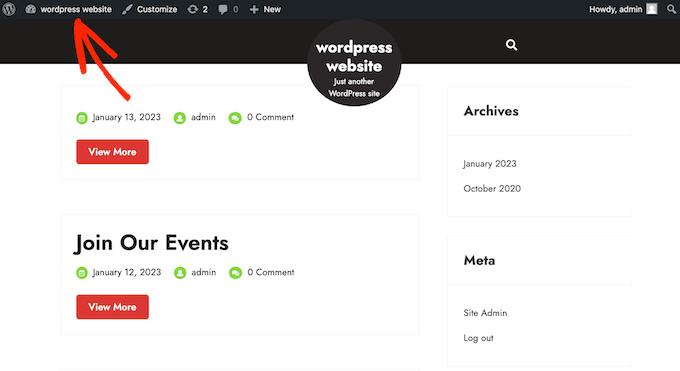
La barra de herramientas de administración de WordPress tiene accesos directos útiles a diferentes áreas del backend de WordPress, y estos accesos directos cambian según el rol y los permisos de un usuario en WordPress.
Sin embargo, la barra de administración puede ser una distracción cuando estás viendo el frontend de tu sitio web.
También puede afectar el diseño y la experiencia del usuario de tu sitio web. Esto puede ser un problema si estás creando o administrando un sitio de WordPress para un tercero, ya que les impide ver cómo se ve realmente su sitio web.
Afortunadamente, existen múltiples formas de deshabilitar la barra de administración para todos los usuarios excepto para los administradores. Simplemente usa los enlaces rápidos a continuación para saltar al método que deseas usar:
- Método 1: Cambiar los permisos de cada usuario en WordPress
- Método 2: Usar código para deshabilitar la barra de administración para usuarios que no son administradores (Recomendado)
- Método 3: Usar un plugin gratuito para deshabilitar la barra de administración para usuarios que no son administradores
Tutorial en video
Si prefieres instrucciones escritas, sigue leyendo.
Método 1: Cambiar los permisos de cada usuario en WordPress
Puedes deshabilitar la barra de administración para usuarios específicos simplemente editando su perfil de usuario. Este es un método rápido y fácil si solo necesitas eliminar la barra para un pequeño número de personas. Sin embargo, si administras un sitio de membresía con muchos usuarios, te recomendamos elegir un método diferente.
Para eliminar la barra de administración manualmente, simplemente ve a la página Usuarios » Todos los Usuarios en el panel de administración de WordPress. Luego, pasa el cursor sobre el usuario de WordPress que no necesita la barra de administración y haz clic en ‘Editar’ cuando aparezca.
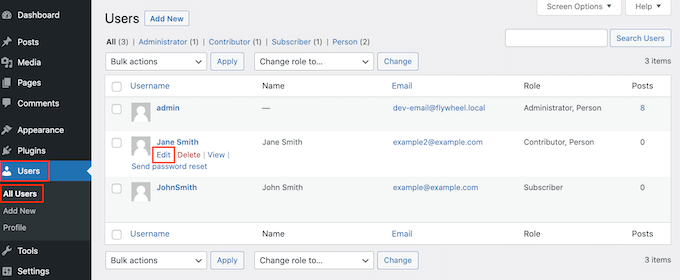
Esto abrirá el perfil de ese usuario.
Desde aquí, desmarca la casilla junto a la opción ‘Mostrar la barra de herramientas al ver el sitio’.
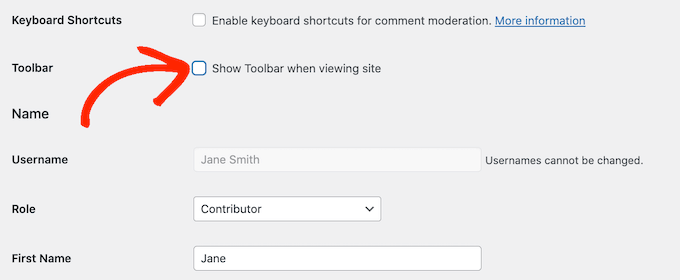
Después de eso, desplázate hasta la parte inferior de la pantalla y haz clic en ‘Actualizar Usuario’ para guardar tus cambios. Esto deshabilitará la barra de administración solo para esa persona específica.
Para ocultar la barra de herramientas para más usuarios, simplemente sigue el mismo proceso descrito anteriormente.
Método 2: Usar código para deshabilitar la barra de administración para usuarios que no son administradores (Recomendado)
Si necesitas ocultar la barra de administración para muchas personas diferentes, cambiar la configuración de cada usuario manualmente llevaría mucho tiempo y esfuerzo.
Por esa razón, recomendamos deshabilitar la barra de administración agregando código al archivo functions.php, que es un archivo del tema de WordPress.
Algunas guías te dirán que edites los archivos del tema manualmente, pero esto puede causar errores comunes de WordPress e incluso dañar completamente tu sitio web.
Por esa razón, recomendamos usar WPCode. Es el mejor plugin de fragmentos de código y facilita la adición de código personalizado en WordPress sin poner tu sitio en riesgo.
Hemos usado WPCode para cambiar el esquema de color del administrador, eliminar el texto 'Hola Admin', deshabilitar el botón de Opciones de pantalla, y más.
Primero, necesitarás instalar y activar el plugin gratuito WPCode. Para más información, consulta nuestra guía paso a paso sobre cómo instalar un plugin de WordPress.
Una vez activado el plugin, ve a Fragmentos de código » Añadir fragmento.
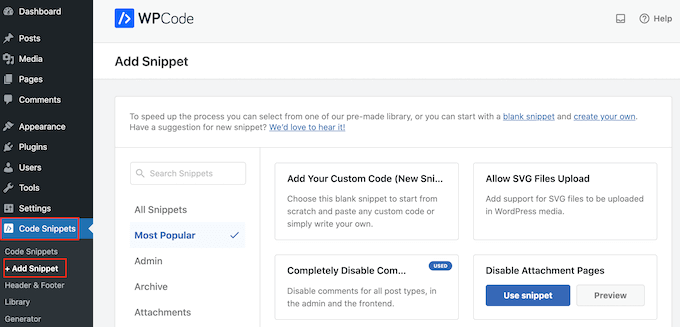
Aquí verás todos los fragmentos prefabricados que puedes añadir a tu sitio.
De hecho, WPCode tiene el fragmento de código exacto que necesitas para deshabilitar la barra de administración en su Biblioteca de Fragmentos integrada. Simplemente ve a Fragmentos de código » Biblioteca.
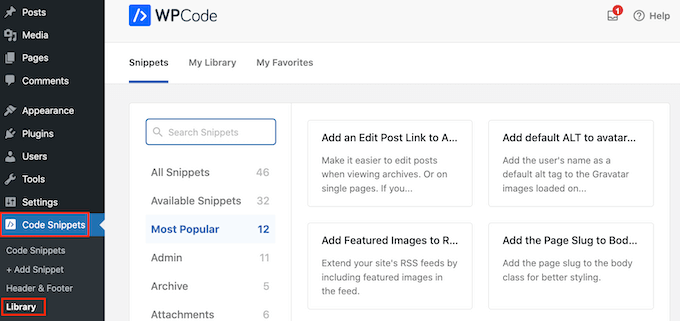
Aquí, busca 'Deshabilitar la barra de administración de WP'.
Cuando aparezca el fragmento correcto, simplemente haz clic en su botón 'Usar fragmento'.
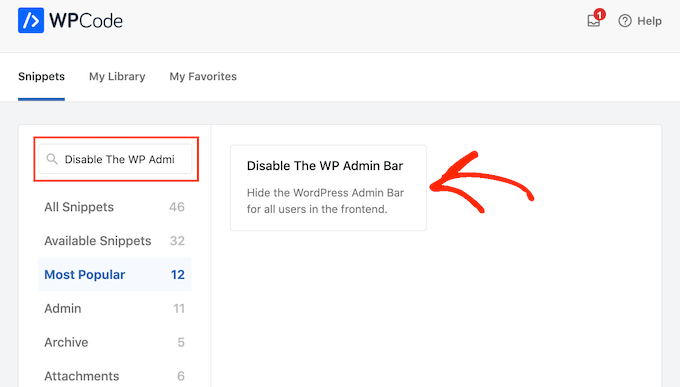
El plugin añadirá automáticamente el código a tu sitio, le dará un título descriptivo, elegirá el método de inserción correcto e incluso añadirá etiquetas para ayudarte a identificar el fragmento.
Así es como se ve el código:
/* Disable WordPress Admin Bar for all users */
add_filter( 'show_admin_bar', '__return_false' );
Ahora, si tu objetivo es deshabilitar la barra de administración para todos los usuarios, entonces todo lo que necesitas hacer es cambiar el interruptor de 'Inactivo' a 'Activo' y luego hacer clic en 'Actualizar'.
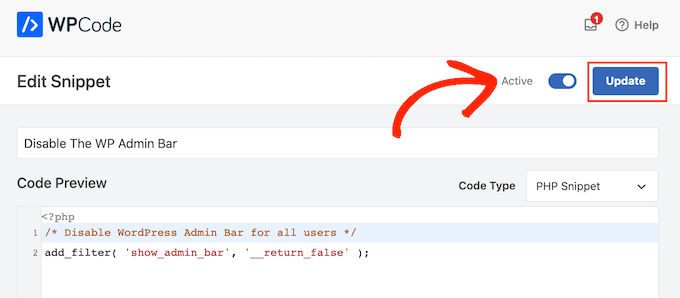
Sin embargo, dado que nuestro objetivo es deshabilitar la barra de administración de WordPress para los usuarios que no son administradores, necesitamos hacer algunos pequeños ajustes al código.
Puedes reemplazar el código existente con el siguiente:
/* Disable WordPress Admin Bar for all users except administrators */
add_filter( 'show_admin_bar', 'restrict_admin_bar' );
function restrict_admin_bar( $show ) {
return current_user_can( 'administrator' ) ? true : false;
}
Este código identifica a cualquier usuario que no sea administrador y que no esté mirando actualmente el panel de administración. Para estos usuarios, deshabilita la barra de administración de WordPress.
Después de eso, desplázate hacia abajo en la página hasta la sección 'Inserción'. Aquí, puedes mantener el método predeterminado 'Inserción automática' para asegurarte de que el código se ejecute en todas partes.
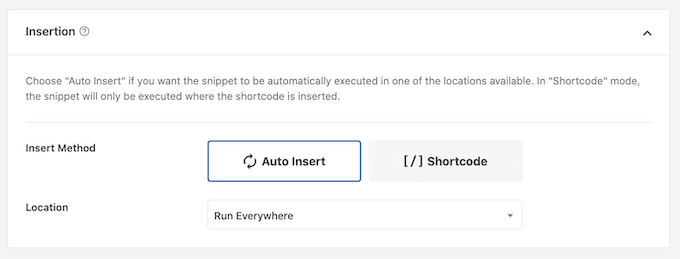
Finalmente, desplázate hasta la parte superior de la pantalla y haz clic en el control deslizante 'Inactivo' para que muestre 'Activo'.
Luego, simplemente haz clic en el botón ‘Guardar fragmento’ o ‘Actualizar’ para que el fragmento de código esté activo.
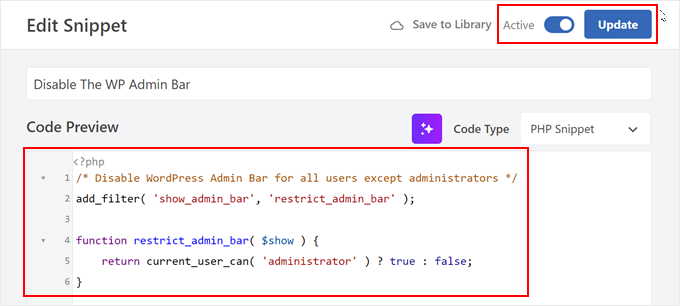
¡Eso es todo! Solo recuerda revisar tu sitio web de WordPress para asegurarte de que todo funcione correctamente.
Método 3: Usar un plugin gratuito para deshabilitar la barra de administración para usuarios que no son administradores
Si no quieres agregar código a tu sitio web, puedes ocultar la barra de administración usando un plugin. Hide Admin Bar Based on User Roles te permite eliminar la barra de herramientas según diferentes roles de usuario, por lo que es una buena opción si deseas deshabilitar la barra para todos los miembros, clientes de WooCommerce o algún otro rol de usuario.
Primero, necesitas instalar y activar el plugin Hide Admin Bar Based on User Roles. Para más detalles, consulta nuestra guía paso a paso sobre cómo instalar un plugin de WordPress.
Después de la activación, debes ir a la página Ajustes » Ajustes de Ocultar Barra de Administración. Desde aquí, marca las casillas junto a los roles de usuario para los que deseas deshabilitar la barra de administración.
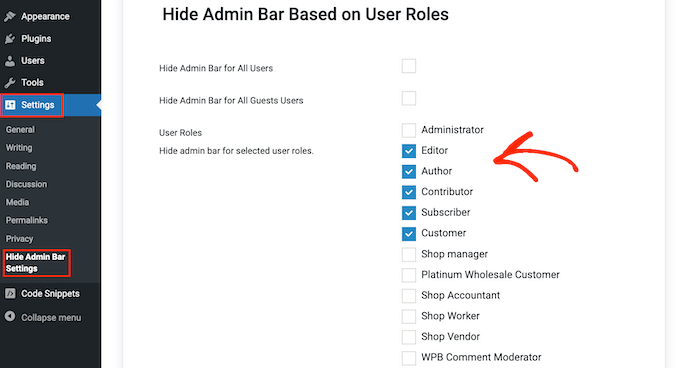
Hecho esto, simplemente haz clic en ‘Guardar Cambios’ para almacenar tu configuración.
Esperamos que este artículo te haya ayudado a aprender cómo deshabilitar la barra de administración de WordPress para todos los usuarios excepto los administradores. También te puede interesar nuestra guía sobre cómo recibir notificaciones por correo electrónico sobre cambios en las publicaciones de WordPress y nuestras selecciones expertas de los mejores plugins de registro y seguimiento de actividad de WordPress.
Si te gustó este artículo, suscríbete a nuestro canal de YouTube para obtener tutoriales en video de WordPress. También puedes encontrarnos en Twitter y Facebook.





Destiny Boy
Esto fue muy simple y directo, me ayudó
ronald osoo
Este código tiene un error, funciona pero no es a prueba de balas. El usuario normal puede omitirlo y acceder al panel de administración de usuario en la parte superior simplemente agregando wp-admin/ a la URL, como si intentara iniciar sesión.
Math
Estoy de acuerdo, el acceso directo a wp-admin/profile.php hace que esto sea inútil.
Steve
Muchos sitios web, no solo de WordPress, tienen la misma opción. Puedes acceder a la página de inicio de sesión de administrador de cualquier sitio web simplemente escribiendo ejemplo.com/admin: eso es normal. Me parece que se ve muy bien sin la barra de administrador.
Alex S
Hola,
Ojalá tu resaltador de sintaxis fuera mejor. Intenté copiar el código y obtuve los números empezando en el 2. No necesito tus números, solo el buen código. Usaría este sitio mucho más si este no fuera el caso.
Gracias.
Soporte de WPBeginner
También puedes hacer clic en el pequeño botón en la esquina superior derecha del fragmento de código. Abrirá el código sin formato en una ventana emergente, que es mucho más fácil de copiar.
Administrador
stefano
Funciona bien, pero la barra permanece para los visitantes que no han iniciado sesión
Jenn
Este plugin funcionaba muy bien y estaba usando Theme My Login. Cuando desactivé ese plugin, ya no funciona como antes... Veo la barra de administrador para todos los usuarios. ¿Alguna sugerencia?
Jenn
Lo siento, quise decir que este 'código' funcionaba muy bien. Creé un plugin específico para el sitio también y todo funcionaba muy bien. Pero después de desactivar Theme My Login, ahora parece no tener ningún efecto y veo la barra de administrador en todos los usuarios.
¿Sugerencias?
Jenn
Acabo de intentar agregar el código para todos los usuarios: show_admin_bar(false); y todavía puedo ver la barra de administrador.
Alexander Pardo
Thank you very much ! A very simple and clean solution.
Jason A. Churchill
No estoy muy versado en la edición del archivo functions.php. Mis dos primeros intentos resultaron en mensajes de error de sintaxis.
¿Dónde exactamente debería colocar este código en el archivo functions.php?
Soporte de WPBeginner
Al final. Si tu archivo functions.php termina con ?> entonces necesitas pegar el código justo antes.
Administrador
Terry Hale
¡Muchas gracias por esto! Sin plugins, agradable, limpio, simple.
Personal de WPBeginner
La barra de administración de WordPress se muestra solo para los usuarios que han iniciado sesión.
Bhris
Gran tutorial directo al grano.
¿Hay una versión del código que bloquee a todos los que no son usuarios? Es decir, que los visitantes del sitio no vean la barra, mientras que todos los usuarios registrados sí la verían?
Shashi
Estaba intentando hacer lo que se mencionaba en el artículo y no funcionó. Usé lo siguiente en su lugar, lo cual me funcionó:
if ( ! current_user_can( ‘manage_options’ ) ) { show_admin_bar( false ); }
Lo anterior se mencionó en el codex de WordPress: http://codex.wordpress.org/Function_Reference/show_admin_bar
vipin
¡¡Muchas gracias, es realmente genial…………
Karen
Neither worked for me. I copied the numbers with the text as I did not know that I could
click on the button on top right corner of the code snippet and copy the raw code. I removed the numbers, but overlooked the seven. I had to change the file entry in via my file manager as I could no longer edit the functions.php. So after a scare and a bit of back and forth I removed the number and the admin bar is still there. I also tried your code Shashi, but it’s not working either.
I have tried every plugin under the sun and nothing will remove the bar.
kim04099
¡¡Gracias!!
Che Boielle
La solución más rápida a un problema extraño que he encontrado e implementado. Gran explicación, instrucciones sencillas de seguir. Gracias chicos, guardaré su sitio en favoritos.
Manthan
Gracias, ¡es la forma más fácil encontrada..!!!
Ryan McGovern
¡Gracias por el fragmento de código!
Anup
¿Por qué no hacerlo simplemente para cualquier usuario específico?
Jack
Sería difícil hacer esto si tienes muchos usuarios.
Róger Marroni
¡¡Buen trabajo, hombre!
¡Muchas gracias!
Mega
Lo intenté y mi sitio está en negro.
Ryan S
el primer paso funciona bien, es algo de tu lado, quizás al implementar el código
Etienne
¡Perfecto fragmento de código… ¡Muchas gracias!
Saludos
Nathan Jansen
Usa esto si quieres esto solo para un rol determinado
function remove_admin_bar() { $user = wp_get_current_user();
if (in_array(‘subscriber’, $user->roles)) { show_admin_bar(false); }
meef
Dios te bendiga. Las respuestas a mis problemas siempre provienen de tus publicaciones.
Gracias
Prem
Finalmente obtuve las respuestas. Gracias.
Paw Pet Directory
Usé esto en mi directorio para mis clientes, pero la barra no desaparece para ellos. Estoy usando 3.8 con el tema AppThemes Vantage (el más reciente)
Cory
Esta es una de esas cosas que, debido a que es una personalización tan pequeña, odiaría usar un plugin. Así que poder poner este pequeño fragmento de código en el functions.php de mi tema hijo me hizo muy feliz. ¡Muchas gracias por compartir! Funciona a la perfección.
Raman
Gracias por publicarlo, fue útil.
Naveen
He agregado este código y funciona bien, pero si un usuario accede a meta, hay una opción para ver al administrador. Si hago clic en esto, el administrador puede ver la página. ¿Cómo evitar esto? No quiero dar el panel de administración a los usuarios. Un usuario puede editar la URL y poner /wp-admin, también puede ver al administrador. No quiero ninguna de las dos cosas, ¿qué hago para esto?
Subodh
La barra de administración está oculta, pero ¿cómo puede un usuario cerrar sesión ahora?
Estoy usando el foro bbpress y un plugin para que los usuarios inicien sesión a través de su cuenta de Facebook para unirse al foro. Pero no encuentro ninguna opción para cerrar sesión.
Soporte de WPBeginner
Se puede proporcionar un enlace para cerrar sesión o iniciar sesión en la barra lateral o en los menús. WordPress viene con un widget predeterminado llamado meta que tiene un enlace de inicio/cierre de sesión. O puedes agregar uno a los menús de navegación de tu sitio. Consulta nuestra guía sobre cómo mostrar diferentes menús a los usuarios registrados
Administrador
Loralee
Gracias por el gran tutorial. Pensé que no funcionaba, ¡y luego, tonto de mí, no había seguido el último paso para activar mi nuevo plugin! ¡¡Muchas gracias por esto! Mucho mejor que instalar varios plugins nuevos.
vikas
Thanks mate….u were really helpful…
tc
Rajat
Gracias Syed, funcionó perfectamente
Bongo
Gracias por esto, me ayudó mucho
Andy Wagstaff
Tengo un área de mi sitio que requiere registro de inicio de sesión.
He configurado la barra de administración para que se "oculte automáticamente" requiriendo un plugin, no quiero deshabilitarla por completo, ya que necesito la capacidad de cambiar la contraseña, pero ¿hay alguna forma de eliminar elementos de la barra para los usuarios? No quiero el nombre del sitio, el logo de WP ni las opciones de extensiones del tema en el lado izquierdo.
¿Es esto posible? Estoy seguro de que sí, ¡pero no lo entiendo!
¡Gracias! Por cierto, sitio muy útil
Andy
Rajiv
Hola,
Quiero deshabilitar la Barra de Administración de BP para Usuarios No Registrados.
Por favor, ayuden.
Ken Shoufer
Hola,
Tu código funcionó bien cuando lo probé localmente en mi computadora, pero cuando lo probé en una instalación nueva de WordPress en mi servidor de alojamiento, no me permitió cerrar sesión. Cuando intenté cerrar sesión, la dirección que aparecía era “http://www.ken-shoufer.com/wordpress1/wp-login.php?action=logout&_wpnonce=9e7f51a307”.
No estoy seguro de qué está mal.
Personal editorial
Eso es raro porque lo tenemos funcionando en nuestro sitio en vivo.
Administrador
Adrian
¡Gracias!
Fabio Santos
Puedes usar este buen plugin en su lugar: http://wordpress.org/plugins/global-admin-bar-hide-or-remove/
Nate
Estoy intentando deshabilitar el logo de W en la esquina superior izquierda, el menú "Mis Sitios" y el enlace al panel de control en una instalación multisitio de Buddypress. Quiero mantener funcional el lado derecho que muestra los enlaces a la configuración del perfil de Buddypress. ¿Cómo puedo lograr esto?
Tanner Moushey
Para evitar el espacio en blanco donde estaba la barra de administración, llama a la función en la acción "after_setup_theme" en lugar de "init".
Cristian O. Balan
¡Realmente perfecto, muchas gracias!
Will
¡Muchas gracias! Esto funcionó perfectamente y resolvió varias horas de dolor de cabeza.
Cristian B.
Código realmente bueno. ¿Hay también una solución para la barra en blanco que muchos aquí se quejan?
David
Hola,
Para evitar el espacio en blanco, simplemente en lugar de:
add_action(‘init’, ‘remove_admin_bar’);
usa:
add_action(‘after_setup_theme’, ‘remove_admin_bar’);
Cristian O. Balan
¡Muchas gracias, amigo!
niki
¡Fantástico! Excepto que también tengo el espacio en blanco visible donde estaría la barra de administración. ¿Alguien tiene una solución para esto?
Marlita Hill
Hola. Gracias por esto. ¿Cómo escribiría el código si solo quiero que la barra sea accesible para administradores y colaboradores? Todavía no quiero que los colaboradores tengan acceso administrativo a mi backend.
Steve
Well… it removes the admin bar but it´s still occupying the space meaning there´s too much space up there now. I´m not sure it´s supposed to be that way?
Adam
funcionó…
Muchas gracias
Nick Cokas
Agregué el código y funcionó perfecto. Sin embargo, el usuario todavía ve un espacio en blanco arriba donde antes estaba la barra de herramientas. ¿Alguna idea para eliminarlo?
Gracias
Toby Couchman
¿Usaste un plugin para colocar todas las cosas necesarias del usuario en el frontend?
Mi equipo construyó recientemente un sitio con requisitos similares y me encantaría comparar los procesos.
Salud
Toby
Mark Coleman
No pases un nombre de rol a current_user_can(), ya que no se garantiza que funcione correctamente. de
http://codex.wordpress.org/Function_Reference/current_user_can
solo para que sepas
Personal editorial
De acuerdo. Acabo de actualizar el código para convertirlo en una función y luego agregarlo a través de una acción.
Administrador
Sally
¡Excelente publicación, muchas gracias!
Me tomó menos de un minuto y la barra desapareció... para siempre... estoy verdaderamente agradecido.
Sally x
x
Corey Freeman
Gracias a esto, tengo un plugin menos que hincha mi sitio. ¡Woo!
Delton Childs
Esta es una publicación increíble. ¡Corto, directo al grano y contenía un fragmento útil! ¡Muchas gracias!
También estoy usando el plugin S2Member, estaba muy preocupado por los problemas de compatibilidad con soluciones basadas en plugins debido a los diversos niveles de S2Membership. Esta solución me está funcionando de maravilla.
¡Gracias de nuevo!
James Davis
Hola a todos,
Acabo de encontrar este fragmento de código y funcionó perfecto para mi sitio...
Muchas gracias
Saludos
James
AKA El Blogger de Fitness
glueckpress
Bien. Para los Superadministradores en una instalación Multisite, se leería como if(!current_user_can(‘manage_network’)) //etc.